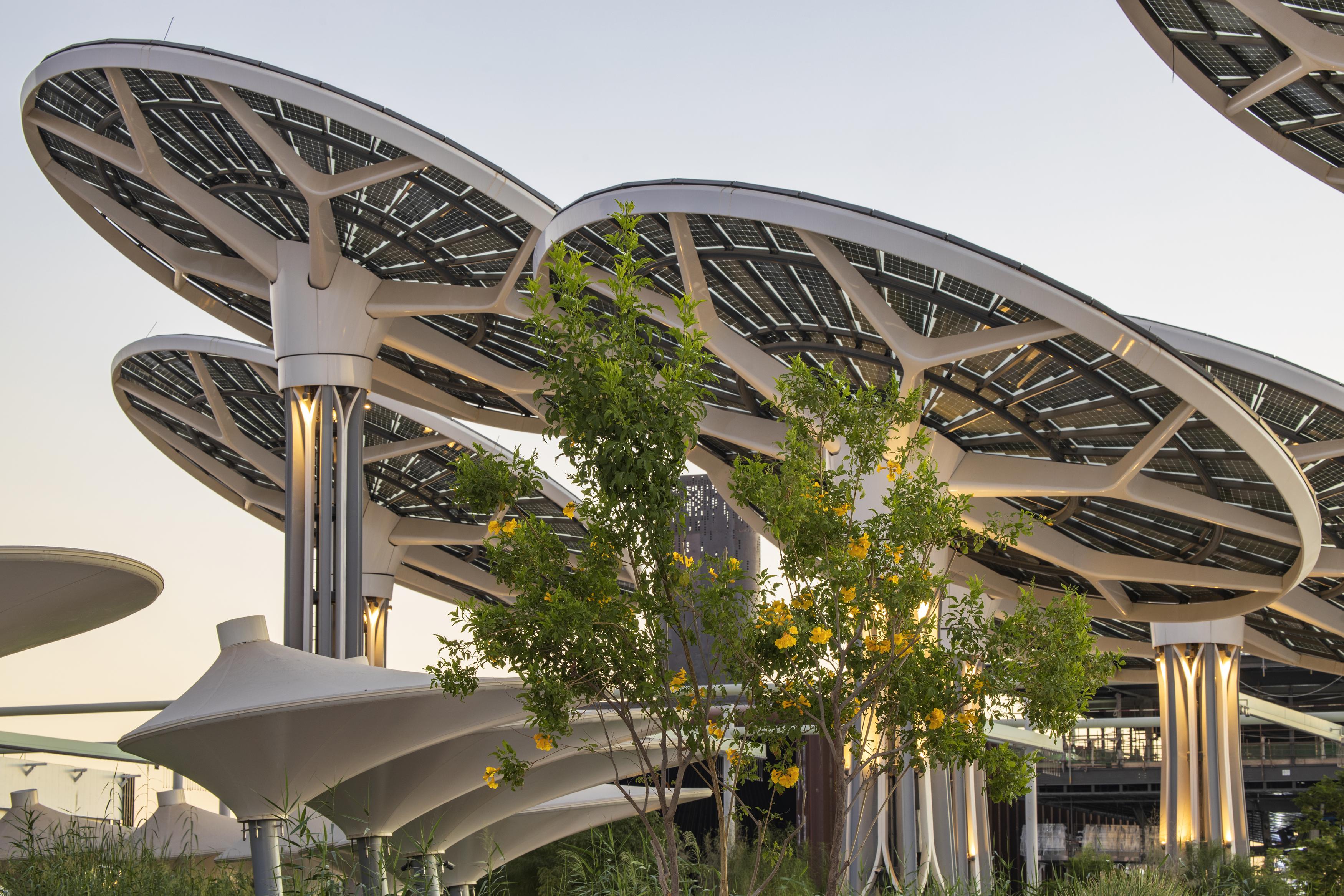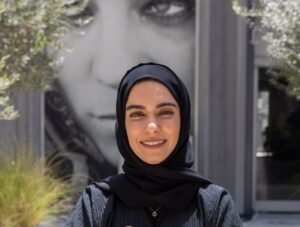Expo City Dubai has opened its doors to the public, offering not only a reminder of the legacy of Expo 2020 Dubai, but a look into the future of how cities could be. Expo City Dubai has retained around 80 per cent of the original Expo-built infrastructure and is part of the Dubai 2040 Urban Master Plan. The unique city is a clean, green, tech-enabled, human-centric city of the future and was designed as a blueprint for ‘green’ urban planning, driving innovation and action on its journey to net zero.

DUBAI, 20 October 2020. Energy Trees at Terra - The Sustainability Pavilion, Expo 2020 Dubai. (Photo by Dany Eid/Expo 2020 Dubai)
The city is based on a deep-rooted belief that a broad coalition of people, working together, can propel human progress to help create a more sustainable and dignified future for all. Expo City Dubai features and array of attractions for visitors ranging from education, cultural and entertainment offerings for all ages, and is the largest area in the world to be fully covered by a 5G-enabled network. When it is complete, the city will feature offices, leisure facilities, dining options, event venues, exercise grounds, and more.

Interior of Alif – The Mobility Pavilion, Expo 2020 Dubai. (Photo by Suneesh Sudhakaran/Expo 2020 Dubai)
With a focus on sustainability and green living, Expo City Dubai will retain more than 120 LEED-certified buildings and eight CEEQUAL-certified projects, each achieving the top ‘Excellent’ rating, epitomising the highest levels of sustainable design, construction and operations. The city is fully pedestrianised, improving safety and air quality with no cars allowed within the districts. It will also feature 10km of cycling tracks, a 5 km running track and 45,000 sqm of parks and gardens. It is the first community to be registered under the WELL Community Standard pilot. Developed by the International WELL Building Institute, this recognises communities that prioritise the health and well-being of all inhabitants and set a benchmark for healthy communities. It will also retain many of Expo 2020’s pioneering urban development initiatives, such as the world’s largest installation of MindSphere – Siemens’ cloud technology platform that uses smart metering and sensors to monitor energy consumption and efficiency of power, light, water and climate conditioning systems.
The initial openings on 1st September and 1st October respectively saw the Expo 2020 Dubai Garden in the Sky observation tower and the icons Al Wasl Plaza reopen to the public, as well as The Sustainability Pavilion which will as an interactive educational experience. Later this year The Opportunity Pavilion will become Mission Possible, the Expo 2020 Dubai Museum, celebrating the success of the six-month event. And visitors will soon be able to experience the UAE Pavilion the Kingdom of Saudi Arabia Pavilion, the Women’s Pavilion, featuring female change-makers across the world and the Vision Pavilion, honouring the life and vision of His Highness Sheikh Mohammed bin Rashid Al Maktoum. Details of several other Country Pavilions – including reworked versions of Luxembourg, Australia, Pakistan, India, Morocco and Egypt – will be announced in the coming months. In addition, the new ‘Stories of Nations’ exhibitions, based in the Opportunity, Mobility and Sustainability Districts will relive the Expo 2020 experiences of those districts and the country pavilions that were located there.
One of the focal elements of the city is to ensure the most advanced cyber-security strategy ever seen at a World Expo. In today’s digital era this is essential for the security and development of the City. As Vice President of Cyber Security and Resilience at Expo City Dubai, Eman Al Awadhi is responsible for defining and implementing this strategy. With more than 12 years’ experience in the industry and significant contributions in the field of cyber security, Al Awadhi is just the woman for the job. We find out more about the processes that have been implanted and the plans for the future of the city.

Eman Al Awadhi
Can you tell us about your role at Expo City Dubai and what it entails?
As Vice President of Cyber Security and Resilience at Expo City Dubai, I was responsible for defining and implementing the most advanced cyber-security strategy ever seen at a World Expo. I am now further advancing this strategy at Expo City Dubai – an integrated destination that will provide the physical, digital and virtual infrastructure to push innovation to new heights and promote a culture of collaboration.
Why is it important for Expo City Dubai to have a cyber security strategy such as this in place?
In today’s digital era, I am tasked with ensuring the security of Expo City Dubai’s technology infrastructure and data, as well as the privacy of all visitor data, which we regard as of utmost importance. Expo City Dubai continues the objective of Expo 2020, using the world’s most advanced cyber security strategies to protect the expansive site and all its infrastructure and technologies – encompassing ticket sales, AI-driven robots, virtual reality, mega screens and more – from unforeseen cyberattacks. As we transform into Expo City Dubai, the human-centric smart city that is repurposing more than 80 per cent of the site’s built environment, we also remain committed to bolstering industry and technology growth in the region.

Garden in the Sky from group level, Expo 2020 Dubai. (Photo by Mahmoud Khaled/Expo 2020 Dubai)
What are some of the biggest challenges you face in your role?
Expo 2020 Dubai – and now Expo City Dubai – offers a model of how to successfully build a sustainable, smart city, and a blueprint for cities of the future. The biggest challenge was to operate and protect a huge site, complete with new, innovative technologies that the world hadn’t seen before, while simultaneously managing a very complex digital infrastructure.
Ensuring that at least 75 per cent of Expo-built infrastructure used smart technology was no small feat, but we rose to the challenge, connecting more than 130 buildings through smart building management system that analyses and visualises data for intelligent decision-making. Expo City Dubai continues to offer a unique opportunity to understand how these smart infrastructure technologies can enable and deliver sustainable communities, inspiring other cities and communities across the world.
What still needs to be done that you are currently working on?
A focus at Expo City Dubai is to integrate office, social, cultural and collaborative spaces to create a smart and sustainable community – a cutting-edge platform that enables technologies such as augmented reality, big data, the Internet of Things, ultra-fast internet connectivity and a 5G mobile network.

Night view of Alif – The Mobility Pavilion, Expo 2020 Dubai (Photo by Suneesh Sudhakaran/Expo 2020 Dubai)
Can you share with us some of the new technologies that are being used on this particular system and how it differs from previous projects you have worked on?
Expo 2020 Dubai harnessed the transformative power of AI to make sure visitors experienced a smooth, safe and secure journey around the site. This included the use of specialist simulation and analytics software to model crowd behaviour and help forecast, track and manage crowd movements across the site. We are looking to fine-tune this further to ensure an even more seamless experience for visitors to Expo City Dubai, and ensure we are always ahead of the curve.
What is something you would still like to do in your role that you haven’t done yet?
We are very fortunate at Expo City Dubai that not only is everything devised and executed in a collaborative fashion but we have also always been aligned with the UAE’s development strategy, at the core of which is innovation. I’m looking forward to being part of more innovative partnerships – creating smart solutions that tackle challenges and prepare us for the future, embracing technology in support of the UAE’s wider diversification and growth goals.















